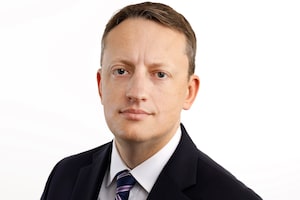Prime Minister Justin Trudeau, left, and NATO Secretary General Jens Stoltenberg speak together at 4 Wing Cold Lake air base in Cold Lake Alta, on Aug. 26.JASON FRANSON/The Canadian Press
NATO Secretary-General Jens Stoltenberg has delivered a stark warning about Russia’s and China’s growing presence in the High Arctic, listing several recent steps by Moscow to increase its military strength in the region.
Speaking Friday at a news conference with Prime Minister Justin Trudeau in Cold Lake, Alta., Mr. Stoltenberg noted that the shortest path to North America for Russian missiles and bombers is over the North Pole.
“The importance of the High North is increasing for NATO and for Canada, because we see a significant Russian military buildup, with new bases, new weapons systems and also using the High North as a testbed for the most advanced weapons, including hypersonic missiles,” he said.
He pointed to Moscow’s new Arctic command and its opening of hundreds of new military bases and Soviet-era sites, including airfields and “novel weapons systems.”
China is also expanding its reach, he said, declaring itself a “near-Arctic state,” with plans to build the world’s largest icebreaker.
He also said Beijing and Moscow have pledged to intensify their co-operation in the Arctic.
“This forms part of the deepening strategic partnership that challenges our values and our interests. Our response is a strong and predictable allied presence in the region,” he said.
The news conference at 4 Wing Cold Lake, a fighter base that supports two CF-18 Hornet squadrons and two training squadrons, took place a day after Mr. Trudeau and Mr. Stoltenberg toured the North Warning System in Cambridge Bay, Nunavut, which is part of the North American Aerospace Defense Command (NORAD). They also visited the Canadian High Arctic Research Station. It was Mr. Stoltenberg’s first official visit to Canada’s Arctic.
They both discussed the fact that climate change requires more focus on the Arctic.
“Climate change is making the High North more important because the ice is melting,” Mr. Stoltenberg said. “And it becomes more accessible, both for economic activity and for military activity.”
The two leaders also highlighted recent announcements regarding Canada’s defence efforts in the North, but no major new initiatives were announced Friday.
Canada has long faced criticism for not delivering on its NATO pledge to spend 2 per cent of its annual economic output on defence.
A June report by Parliamentary Budget Officer Yves Giroux said Canada would need to spend an additional $75-billion over the next half-decade – about $13-billion to $18-billion a year – to meet that goal.
That report found that Canada’s military spending of $36.3-billion this fiscal year represents just 1.33 per cent of GDP and that currently planned increases would bring that amount to $51-billion, or 1.59 per cent of GDP, by 2026-27.
During the news conference, the two leaders were asked to comment on Canada’s military spending shortfall. Mr. Stoltenberg praised Canada’s various commitments to NATO and NORAD but did not criticize its spending levels.
Mr. Trudeau said Canada has significantly increased its defence spending in recent years.
“We certainly recognize that after decades of unprecedented peace, Russia’s decision to invade Ukraine is requiring us all to step up even more on defence spending. And that’s exactly what we have done over the past seven years,” he said.
Russia’s Feb. 24 invasion of Ukraine has led to dramatic shifts for NATO.
Moscow cited its concern over NATO encroachment on its borders in the weeks before launching its attack.
But its goal of containing NATO backfired. Sweden and Finland, which shares a 1,340-kilometre border with Russia, applied to join the military alliance in May.
Mr. Stoltenberg noted that if they eventually become members, seven out of eight Arctic countries will be part of the alliance.
Mr. Trudeau said hosting NATO’s Secretary-General in Canada’s Arctic does not represent a change in government policy. He also restated Ottawa’s position regarding the Northwest Passage sea corridor.
“The Northwest Passage is Canadian waters. Period,” he said. “We have a long-standing disagreement with the United States on that one, but they have understood our position and our allies respect Canada’s position.”
Will Greaves, an assistant professor of political science at the University of Victoria who specializes in Arctic politics and global security, said this week’s tour is symbolic.
“The visit is a way of highlighting Canada’s commitment to the Allied effort against Russia. The Arctic is one flank of that,” he said.
Prof. Greaves also said that, despite Mr. Trudeau’s assertion that Canadian policy has not changed, the visit does suggest a softening of Canada’s traditional stand of resisting NATO involvement in the Arctic. He said it shows that “the situation has shifted in light of the last six months, and that Canada won’t any longer have those same kinds of objections to an Allied presence in the North.”
For subscribers: Get exclusive political news and analysis by signing up for the Politics Briefing.
 Bill Curry
Bill Curry